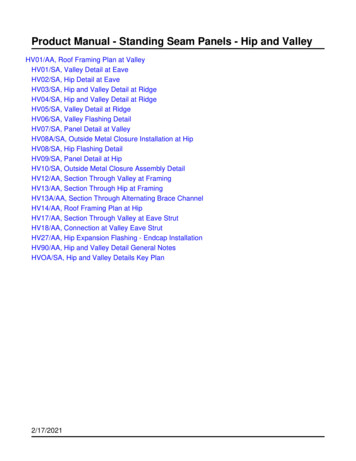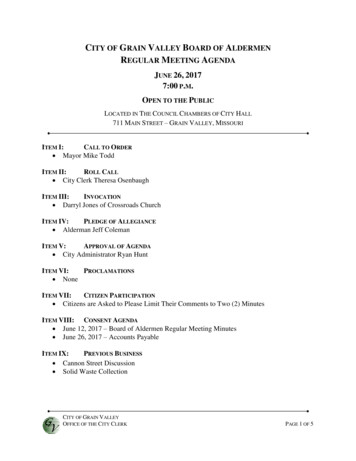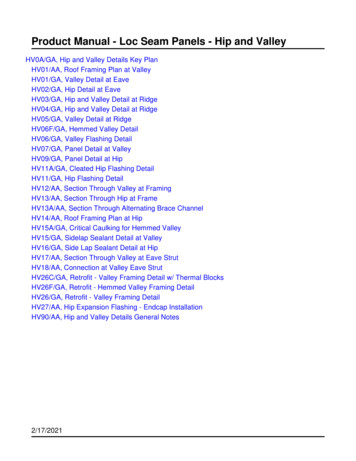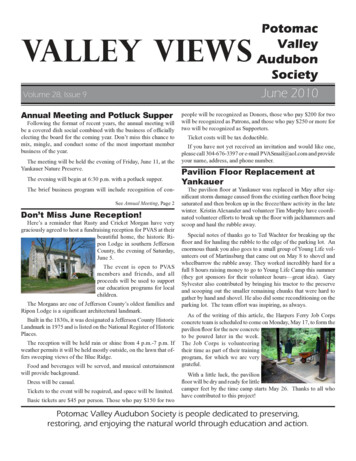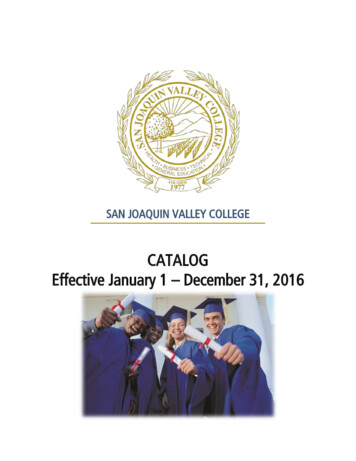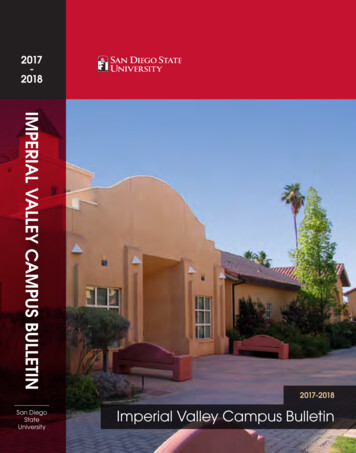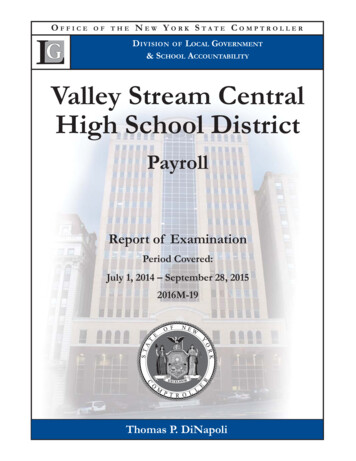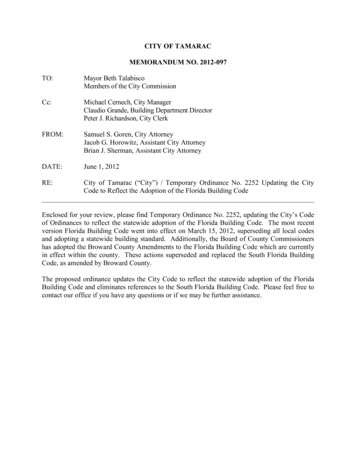
Transcription
Department of Business 1Department of BusinessVangstad 120Department Chair: Brenda Tyre, CPA, CGMA, MBAbrenda.tyre@vcsu.edu (brend.tyre@vcsu.edu)800.532.8641 x37515701.845.7515busdept.vcsu.edu (http://busdept.vcsu.edu)Today’s global economy is more competitive than ever, and VCSU is a greatplace to establish an academic foundation for success. VCSU BusinessFaculty bring real-world experience to the classroom to create a practicallearning environment which is reinforced with theoretical knowledge. Facultystrive to create strong relationships with local businesses to create moreopportunities for job shadowing and internships.The mission of the Department of Business is to offer learner centeredbusiness programs that prepare students for careers in a diverse and everchanging global economy by developing the skills employers identify as vital.Basile, Edward (2022) Assistant Professor; B.S., M.B.A Norwich University,Doctoral Candidate Walden UniversityKatuin, Tammy (2018) Assistant Professor; A.S. Reedley College, B.A. FresnoPacific University, M.B.A. University of North DakotaMounts, Taylor (2021) Assistant Professor; B.B.A.,M.B.A Harding UniversityRoss, Richard (1999) Associate Professor; B.A., B.S. Minot State University,M.S. Tri-College UniversityTyre, Brenda (2013) Associate Professor; B.S. Minnesota State UniversityMoorhead, M.B.A. University of Mary; CPAWright, Wesley (2022) Assistant Professor; B.S., MAcc Brigham YoungUniversity, M.B.A Florida State UniversityMajors Bachelor of Applied Science - Management grams/majors/management/) Business Administration - Composite (B.S.) Agribusiness Concentration ncentration/) Human Resource & Management Concentration es-managementconcentration/) Managerial Accounting & Finance Concentration counting-financeconcentration/) Marketing Concentration ntration/) Business Education - Composite (B.S. in Education) grams/majors/businesseducation-composite/) Business Education (B.S. in Education) grams/majors/business-education/) Business Process Integration Management - Composite (B.S.) t/) Career and Technical Education - Composite (B.S.) grams/majors/careertechnical-education/) Career and Technical Education B.S. in Education - Composite (B.S. inEducation). on/)Minors AgriBusiness grams/minors/agribusiness/) Business grams/minors/business/) Business Software Applications Minor grams/minors/business-softwareapplications/) Human Resources grams/minors/human-resources/) Marketing grams/minors/marketing/)Certificate Business Management grams/certificates/business-management/) Digital Marketing grams/certificates/digital-marketing/) Professional Sales grams/certificates/professional-sales/)ACCT 200. Elements of Accounting I. 3 Credits.An introduction to accounting systems with a special emphasis onjournalizing and posting business transactions, preparation of the balancesheet and income statement, and accounting for short-term assets.Typically Offered: Fall.ACCT 201. Elements of Accounting II. 3 Credits.A continuation of ACCT 200 with a special emphasis on accounting for longterm assets and current and long-term debt obligations, corporate equityaccounting, and preparation of the Statement of Cash Flows.Typically Offered: Spring.Prerequisite: ACCT 200 with a grade of C or better.ACCT 307. Managerial Accounting and Finance. 3 Credits.A course designed to help students understand how to use information toeffectively plan and control operations. Topics include concepts and toolsused in planning, control and decision making.Typically Offered: Spring.Prerequisite: ACCT 201.
2 Department of BusinessACCT 315. Business in the Legal Environment. 3 Credits.A study of the legal environment of business, governmental regulation,contracts and property.Typically Offered: Fall, Spring.ACCT 321. Intermediate Accounting I. 3 Credits.A study of the more complex issues of corporate reporting theory andtechniques such as the conceptual framework, financial statements,valuation techniques, and revenue recognition. The course will explorecurrent financial reporting requirements as well as emerging issues andcontroversies surrounding financial reporting.Typically Offered: Fall.Prerequisite: ACCT 201.ACCT 322. Intermediate Accounting II. 3 Credits.A study of selected financial accounting and reporting issues related to longterm assets, long-term debt, and shareholders' equity.Typically Offered: Spring.Prerequisite: ACCT 201.ACCT 355. Taxation of Business Entities. 3 Credits.A study federal income tax law related to reporting business and investmentactivities of sole proprietorships, partnerships, and corporations.Typically Offered: Fall.Prerequisite: ACCT 201.ACCT 369. Enterprise Systems. 3 Credits.An exploration of how enterprise systems help companies integrate businessfunctions and improve business processes. Students will identify and discussintegration points including impacts to accounting.Typically Offered: Fall, Spring.Same As: ACCT 369/CIS 369.ACCT 399. Special Topics. 1-4 Credits.Courses not offered in the regular catalog that provide an opportunity toextend student learning.Typically Offered: On sufficient demand.Repeatable: Up to 12 Credits.ACCT 440. Advanced Accounting Topics. 3 Credits.A study of selected accounting and reporting issues related to consolidatedentities, partnerships, state and local governments, and non-profitorganizations. Students will also be introduced to audit procedures relatingto the revenue business process and the acquisitions and expendituresbusiness process.Typically Offered: Fall.Prerequisite: ACCT 322.ACCT 450. Principles of Auditing. 3 Credits.A study of auditing principles and practices including evidence gathering,internal controls, sampling and testing, report writing, ethics, and legalliabilities.Typically Offered: Spring.Prerequisite: ACCT 322.ACCT 494. Undergraduate Research. 3-12 Credits.The course is designed to integrate subject matter from major courseworkand other disciplines into a project that leads to the creation of an originalbody of knowledge.Typically Offered: On sufficient demand.Repeatable: Up to 12 Credits.ACCT 499. Special Topics. 1-4 Credits.Courses not offered in the regular catalog that provide an opportunity toextend student learning.Typically Offered: On sufficient demand.Repeatable: Up to 12 Credits.BUSI 102. Keyboarding Methods. 3 Credits.An exploration of keyboarding techniques in speed and accuracy; formattingof business communication forms for use in a classroom. Students willacquire keyboard curriculum while exploring different methods and trendsof teaching keyboarding as part of a Business Education program. Specialemphasis will be placed on technology, variety of instructional strategies, andlesson design.Typically Offered: Spring.BUSI 199. Special Topics. 1-4 Credits.Courses not offered in the regular catalog that provide an opportunity toextend student learning.Typically Offered: On sufficient demand.Repeatable: Up to 12 Credits.BUSI 214. Business Communications. 3 Credits.A focus on the improvement of oral and written communication skills forapplication in today's global business environment. This course includesexploration and application of modern communication theory, legal andethical concerns, and technology use. Intrapersonal, interpersonal, and groupcommunication processes and skills are reviewed, as is public presentationof information.Typically Offered: Fall, Spring.Prerequisite: ENGL 120 or ENGL 125.BUSI 249. Introduction to Business. 1 Credit.An introduction to the business professions with emphasis on programrequirements. The study, practice and performance of marketing,management, entrepreneurship, finance and human resources.Typically Offered: Fall, Spring.BUSI 299. Special Topics. 1-4 Credits.Courses not offered in the regular catalog that provide an opportunity toextend student learning.Typically Offered: On sufficient demand.Repeatable: Up to 12 Credits.BUSI 336. Business Data Solutions. 3 Credits.An exploration of the advanced concepts of spreadsheets and databasetools. This course provides intermediate/advanced students with the theoryand ability needed to apply such knowledge in a business environment.Typically Offered: Fall, Spring.BUSI 337. Authoring Digital Publications. 3 Credits.An exploration of the advanced concepts of word processing and desktoppublishing. This course provides intermediate/advanced students withthe theory and ability needed to create effective professional businesspublications.Typically Offered: Fall, Spring.
Department of Business 3BUSI 350. Operations Management. 3 Credits.A study of performance measurement tools, quantitative tools and operationsstrategy. Students will learn how the concepts and applications usedenhance the decision making process through the development of statisticaland quantitative analysis.Typically Offered: Fall, Spring.Prerequisite: MGMT 330.BUSI 387. Business Practicum. 1-12 Credits.The business practicum allows students to complete experiential learningopportunities which are guided by a designated business faculty members.Students develop real-world experience through collaboration andinteraction with industry. Application and approval through business facultyrepresentative.Typically Offered: Fall, Spring, Summer.Prerequisites: Junior Standing or Senior Standing and cum GPA of 2.50 orhigher.Grading: S/U only.Repeatable: Up to 12 Credits.BUSI 399. Special Topics. 1-4 Credits.Courses not offered in the regular catalog that provide an opportunity toextend student learning.Typically Offered: On sufficient demand.Repeatable: Up to 12 Credits.BUSI 480. Strategic Planning. 3 Credits.A study of strategic management processes on how organizationsformulate, implement, and evaluate strategies. The course integrates theknowledge acquired in the functional areas of marketing, human resources,productions/operations and finance.Typically Offered: Fall, Spring.Prerequisite: Senior Standing.BUSI 485. Entrepreneurship. 3 Credits.A review of the application of business policies and procedures to the smallbusiness environment. BUSI 485 includes the basic steps in creating,building, operating and selling an enterprise.Typically Offered: Fall, Spring.Prerequisite: Senior Standing.BUSI 490. Methods and Materials for Teaching Business Subjects. 3Credits.An exploration of the curriculum, methods, materials, trends, and philosophyin the teaching of business education. Students will be exposed to theTeaching and Learning Capstone requirements. Special emphasis is placedon technology, various instructional strategies, and Technical EducationTeacher Credentialing Requirements. The course must be taken beforestudent teaching.Typically Offered: Fall.Prerequisite: Admitted to Teacher Education.Same As: BUSI 490/CTE 490.BUSI 491. Senior Seminar. 1 Credit.An exploration of job search and soft skills necessary for success in theworkplace. Students will participate in a variety of activities to develop aprofessional persona.Typically Offered: Fall, Spring.Prerequisite: Senior Standing.BUSI 497. Internship. 3-12 Credits.An opportunity for students to apply classroom learning to an on-the-job workexperience. Internship must be related to the student's major or minor courseof study and may be in any geographic location. Credit is granted in the rangeof three to twelve hours per semester and may be repeated up to a maximumof 12 credit hours. Application and approval through Career Services.Typically Offered: Fall, Spring, Summer.Prerequisites: Junior Standing or Senior Standing and cum GPA of 2.50 orhigher.Grading: S/U only.Repeatable: Up to 12 Credits.BUSI 499. Special Topics. 1-4 Credits.Courses not offered in the regular catalog that provide an opportunity toextend student learning.Typically Offered: On sufficient demand.Repeatable: Up to 12 Credits.BUSI 610. Financial Management for Information TechnologyProfessionals. 3 Credits.A course that provides the fundamental knowledge for individuals makingfinancial decisions in information technology organizations.Typically Offered: Spring.BUSI 620. Information Systems Strategy. 3 Credits.An introduction to approaches that enable business strategy with informationsystem solutions.Typically Offered: Summer, odd years.CTE 199. Special Topics. 1-4 Credits.Courses not offered in the regular catalog that provide an opportunity toextend student learning.Typically Offered: On sufficient demand.Repeatable: Up to 12 Credits.CTE 299. Special Topics. 1-4 Credits.Courses not offered in the regular catalog that provide an opportunity toextend student learning.Typically Offered: On sufficient demand.Repeatable: Up to 12 Credits.CTE 394. Independent Study. 1-3 Credits.Directed reading, study, and/or activities in selected topics.Typically Offered: On sufficient demand.Repeatable: Up to 12 Credits.CTE 399. Special Topics. 1-4 Credits.Courses not offered in the regular catalog that provide an opportunity toextend student learning.Typically Offered: On sufficient demand.Repeatable: Up to 12 Credits.CTE 431. History, Philosophy and Practices of Career and TechnicalEducation. 3 Credits.A study of history, growth, theory and present status of Career and TechnicalEducation in secondary and post-secondary schools. The course focuses onprinciples, practices and major issues of Career and Technical Educationand its relationship to individual Career and Technical service areas. Thiscourse will also cover relationships between general education and Careerand Technical Education.Typically Offered: Fall, Summer.
4 Department of BusinessCTE 432. Coordinating Cooperative Education Learning. 3 Credits.A study of principles and techniques used in coordinating cooperative workexperiences for students in Career and Technical Education. Included is astudy of labor laws, public relations programs, advisory committees, andorganization and supervision of on-the-job training, evaluation, and follow-upof student learners.Typically Offered: On sufficient demand.CTE 434. Leadership in Career and Technical Student Organizations. 3Credits.Introduction to planning, implementing, and leading Career and TechnicalStudent Organizations. This course is designed for advisors at the secondaryand post-secondary level wishing to begin, expand, or promote Career andTechnical Student Organizations.Typically Offered: Spring, Summer.CTE 499. Special Topics. 1-4 Credits.Courses not offered in the regular catalog that provide an opportunity toextend student learning.Typically Offered: On sufficient demand.Repeatable: Up to 12 Credits.ECON 201. Principles of Microeconomics. 3 Credits.This is an introductory study of microeconomics. The course emphasizes theprice system, market structure, resource allocation, and income distribution.Typically Offered: Fall, Spring.ECON 202. Principles of Macroeconomics. 3 Credits.This is an introductory study of macroeconomics. The course emphasizesnational income, fiscal and monetary theory and policy, unemployment, andinflation.Typically Offered: Fall, Spring.CTE 437. Student Performance Evaluation in Career and TechnicalEducation. 3 Credits.An examination of methods used for a comprehensive program of assessingand evaluating student achievement. Included is a study of the need for asystem of evaluation and construction of evaluative instruments to measurelearner outcomes to enhance improved academic and work performance.Typically Offered: Fall.ECON 261. Business Statistics. 3 Credits.The course introduces students to descriptive and inferential statistics.Topics include: probability, data collection methods, inferences about one ormore populations, tests of significance, tests of hypotheses, and regressionanalysis.Typically Offered: Fall, Spring.Prerequisites: BOTE 336 and MATH 103.CTE 438. Developing and Managing Competency-Based InstructionalMaterials. 3 Credits.A basic course for Career and Technical educators. The course introducesconcepts supporting the development of competency-based education(CBE) curriculum materials. CBE terminology, illustrations, presentations,procedures, and resources that relate to Career and Technical Education arediscussed and a CBE learning unit of instruction is developed.Typically Offered: Spring.ECON 299. Special Topics. 1-4 Credits.Courses not offered in the regular catalog that provide an opportunity toextend student learning.Typically Offered: On sufficient demand.Repeatable: Up to 12 Credits.CTE 490. Methods for Teaching Career & Technical Education Subjects. 3Credits.A concentration on methods used for teaching Career and TechnicalEducation courses. Topics are designed to develop and enhance theinstructional competencies for teachers in Career and Technical Educationprograms.Typically Offered: Fall, Summer.Same As: BUSI 490/CTE 490.CTE 492. Career and Technology Education Teaching Experience. 1-12Credits.Provides an online supervised teaching mentorship program to be usedin place of a student teaching experience when a mentorship is allowedfor satisfying the requirements of licensure. Students will observe mentorteacher(s), prepare units for delivery of content, maintain a log of activities,conduct or participate in parent/teacher conferences, observe or participatein IEP meetings, and meet with mentors and supervisors as required.Typically Offered: On sufficient demand.CTE 494. Undergraduate Research. 3-12 Credits.The course is designed to integrate subject matter from major courseworkand other disciplines into a project that leads to the creation of an originalbody of knowledge.Typically Offered: On sufficient demand.Repeatable: Up to 12 Credits.ECON 345. International Political Economy. 3 Credits.This course introduces students to the study of international politicaleconomy (IPE). The course focuses on the political foundations andconsequences of the contemporary world economy. The course will surveythe evolution of the international economic system, in particular since theSecond World War, emphasizing the main contemporary theories, debates,and issues shaping the global economy and politics.Typically Offered: Spring, even years.Same As: POLS 345/ECON 345.ECON 350. Money and Banking. 3 Credits.A course designed to acquaint students with, and to help them understand,financial markets, institutions, and the Federal Reserve System. The courseenables students to analyze and evaluate regulation of the financial systemas well as monetary policy. Current issues in domestic and internationalfinancial systems are emphasized.Typically Offered: Fall, even years.Prerequisites: ECON 201 and ECON 202.ECON 394. Independent Study. 1-3 Credits.Directed reading, study, and/or activities in selected topics.Typically Offered: On sufficient demand.Repeatable: Up to 12 Credits.ECON 399. Special Topics. 1-4 Credits.Courses not offered in the regular catalog that provide an opportunity toextend student learning.Typically Offered: On sufficient demand.Repeatable: Up to 12 Credits.
Department of Business 5ECON 460. The Atlantic World. 3 Credits.This course is an interdisciplinary investigation of the political, economic,and social developments that shaped the region, from the age of empiresto the decolonization of the twentieth century. Using a comparativeapproach, this course examines the Atlantic community constructed betweenAfrica, Western Europe and the Americas, with particular attention to theinteractions on matters of migration, market economies, ideology and culturalexchange. Cross-referenced with HIST 460 and GEOG 460.Typically Offered: Spring, odd years.Same As: ECON 460/GEOG 460/HIST 460.ECON 494. Undergraduate Research. 3-12 Credits.The course is designed to integrate subject matter from major courseworkand other disciplines into a project that leads to the creation of an originalbody of knowledge.Typically Offered: On sufficient demand.Repeatable: Up to 12 Credits.ECON 499. Special Topics. 1-4 Credits.Courses not offered in the regular catalog that provide an opportunity toextend student learning.Typically Offered: On sufficient demand.Repeatable: Up to 12 Credits.FIN 350. Foundations of Banking. 3 Credits.An introduction to Financial Institutions and Financial Markets. Topicsinclude Financial Assets, the Banking System, and Operations of FinancialInstitutions.Typically Offered: Spring.FIN 375. Managerial Finance. 3 Credits.An introduction to corporate finance. Emphasis will be placed on valuationtechniques and long-term financial planning for business entities.Typically Offered: Fall.Prerequisite: ACCT 201 and a General Education Math class.FIN 376. Managerial Finance II. 3 Credits.A continuation of managerial finance with an emphasis on short-termfinancial planning for business entities, risk management, use and valuationof options, and selected international corporate finance issues.Typically Offered: Spring.Prerequisite: FIN 375 with a grade of C or better.FIN 380. Principles of Investments. 3 Credits.A course designed to provide the student with an understanding of themechanics and principal problems of investing. Topics include the stockmarket, real estate, mutual funds, gold and collectibles.Typically Offered: Spring.FIN 499. Special Topics. 1-4 Credits.Courses not offered in the regular catalog that provide an opportunity toextend student learning.Typically Offered: On sufficient demand.Repeatable: Up to 12 Credits.MGMT 235. Diversity in the Workplace. 3 Credits.A course exploring several aspects of the role of diversity in the workplace,including its importance across business functions. Topics include legality ofdiversity in the workplace, managing inclusion and varying perspectives andcontributions of diverse groups.Typically Offered: Fall, Spring.MGMT 270. Business Ethics. 3 Credits.An investigation of the ethical dilemmas that the contemporary Americanand global business worlds face. The course examines the role of businessin society, the nature of corporate social responsibility, environmental issues,and the influences of the social, political, legal, and regulatory environment.The course also challenges students' thinking about the impact of diversityon organizations, the relationship between business and the media, and thegrowth of e-business.Typically Offered: Fall, Spring.MGMT 299. Special Topics. 1-4 Credits.Courses not offered in the regular catalog that provide an opportunity toextend student learning.Typically Offered: On sufficient demand.Repeatable: Up to 12 Credits.MGMT 330. Principles of Management. 3 Credits.A study of management and organizational theory with special attentiongiven to functions of planning, organizing, leading, and controlling in businessorganizations.Typically Offered: Fall, Spring.MGMT 340. Human Resource Management. 3 Credits.A study of human resource management (HRM) including HRM planning,labor relations and labor law, job analysis, recruitment, selection, evaluation,compensation, benefits, training, discipline, safety/health, and internationallabor issues.Typically Offered: Fall, Spring.MGMT 372. Foundations of Leadership. 3 Credits.A course designed to introduce the foundations of leadership. The courseexamines a theoretical background and practical information. Majortheories of leadership will be examined and leadership will be integratedto various internal and external organizational factors. Student will learn tothink critically about the leadership phenomenon and about the boundaryconditions of leadership theories.Typically Offered: Fall, Spring.MGMT 381. Project Management. 3 Credits.An investigation of the project management techniques and appropriatesoftware used to effectively manage projects. This course covers theknowledge areas and other topics as defined by the Project ManagementBody of Knowledge (PMBOK). Cross-referenced with CIS 381 and SE 381.Typically Offered: Spring.MGMT 399. Special Topics. 1-4 Credits.Courses not offered in the regular catalog that provide an opportunity toextend student learning.Typically Offered: On sufficient demand.Repeatable: Up to 12 Credits.MGMT 430. Organizational Behavior. 3 Credits.An interdisciplinary study of behavior in the work environment to improveskills in leadership, motivation and communication.Typically Offered: Fall-even yrs, Spring-odd yrs.Prerequisite: MGMT 330.
6 Department of BusinessMGMT 460. International Business. 3 Credits.A study of the international dimensions of business: global businessenvironment (economic, cultural, legal, political) and international businessfunctions (management, marketing, finance, exporting, importing).Typically Offered: Fall, Spring.Prerequisite: MGMT 330.MGMT 498. International Experience. 6-12 Credits.An opportunity to apply classroom learning in a foreign setting. Theexperience must be related to the student¿s area of study and is granted ina range of six to twelve credits per semester with a maximum of twelve hoursavailable. Application is made through the Department of Business.Typically Offered: Fall, Spring, Summer.Prerequisite: Junior Standing or Senior Standing.Repeatable: Up to 12 Credits.MGMT 499. Special Topics. 1-4 Credits.Courses not offered in the regular catalog that provide an opportunity toextend student learning.Typically Offered: On sufficient demand.Repeatable: Up to 12 Credits.MRKT 199. Special Topics. 1-4 Credits.Courses not offered in the regular catalog that provide an opportunity toextend student learning.Typically Offered: On sufficient demand.Repeatable: Up to 12 Credits.MRKT 305. Principles of Marketing. 3 Credits.An analysis of the activities, set of institutions, and processes for facilitatingthe exchange of products, services, and information. Topics include strategicplanning; marketing segmentation, targets, and positioning; marketingresearch; sales; and public relations; creating, communicating, delivering,and exchanging offerings that have value for customers, clients, partners,and society at large.Typically Offered: Fall, Spring.MRKT 310. Digital Marketing. 3 Credits.This course examines the theoretical understanding of the Internetmarketplace, how to adapt to its many changes and the skills needed toperform vital daily functions within digital marketing.Typically Offered: Fall, even years.Prerequisite: MRKT 305.MRKT 319. Website Authoring. 3 Credits.A course designed to provide knowledge and skills to complete websiteproject management. Students will learn to assemble and organize websites,production teams, develop goals, management schedules and budgets, andevaluate and evolve a commercial Web presence and students will perform aredesign and maintenance schedule of a professional website.Typically Offered: Fall, Spring.MRKT 340. Professional Sales. 3 Credits.A course designed to focus on the principles and fundamentals of sellingpsychology, customer motivation, and sales steps with emphasis ontechniques and human relations in selling situations. Students will determineclient needs and wants and respond through planned, personalizedcommunication that influences purchase decisions and enhances futurebusiness opportunities. Students will participate in product knowledge,analyzing the customer, and investigating the competition and capitalizing onthe sale through experience exercises.Typically Offered: Spring.Prerequisite: MRKT 305.MRKT 370. Advertising and Promotions. 3 Credits.A thorough exploration of the communication process and consumerresponses throughout that process. Students will acquire the skills needed tomake strategic decisions regarding the use of traditional and/or new mediato develop and carryout advertising campaigns.Typically Offered: Fall.Prerequisite: MRKT 305.MRKT 375. Consumer Behavior. 3 Credits.This class examines consumer behavior and the practical marketingimplications of that behavior.Typically Offered: Fall, odd years.Prerequisite: MRKT 305.MRKT 394. Independent Study. 1-3 Credits.Directed reading, study, and/or activities in selected topics.Typically Offered: On sufficient demand.Repeatable: Up to 12 Credits.MRKT 399. Special Topics. 1-4 Credits.Courses not offered in the regular catalog that provide an opportunity toextend student learning.Typically Offered: On sufficient demand.Repeatable: Up to 12 Credits.MRKT 405. Retailing. 3 Credits.A study of the field of retailing. Topics include establishing and maintainingrelationships, basic principles of strategic planning, goods/servicescategories, targeting customers, gathering information, choosing a storelocation, merchandise management and pricing, and communication with thecustomer.Typically Offered: Fall.Prerequisite: MRKT 305.MRKT 414. Social Media Management. 3 Credits.An exploration of managing social media and analytical tools. This courseexplores the tools and strategical use of social media in promoting thegoals and mission of both for-profit and non-profit organiz
Pacific University, M.B.A. University of North Dakota Mounts, Taylor (2021) Assistant Professor; B.B.A.,M.B.A Harding University . current financial reporting requirements as well as emerging issues and controversies surrounding financial reporting. Typically Offered: Fall. . Junior Standing or Senior Standing and cum GPA of 2.50 or higher .
